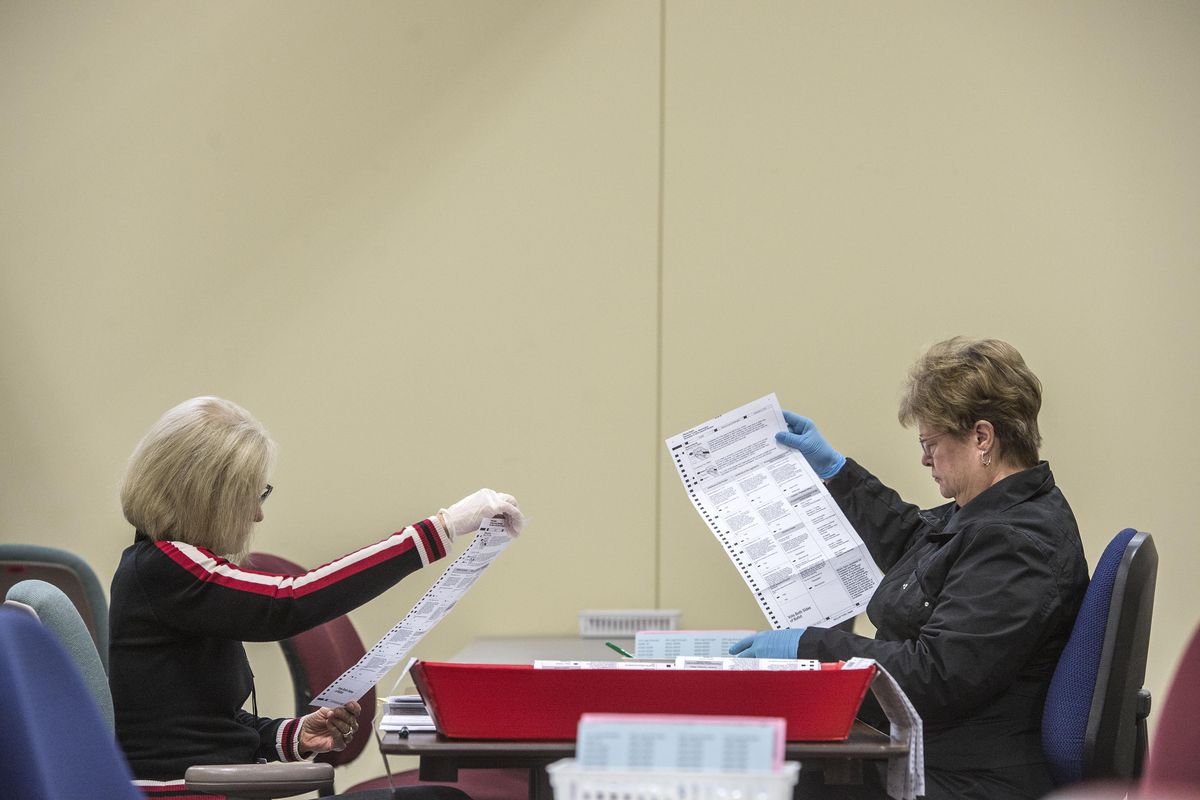Elections observers’ work is boring, but important to instill confidence

While presidential candidate Donald Trump has repeatedly urged his supporters to monitor polling places this November – claiming widespread voter fraud and a rigged election – the reality for election observers in Spokane is more boring.
And that’s a good thing.
“I’ve worked with the election people,” said Dave Moore, the chairman of the Spokane County Republican Party. “They are doing a pretty good job of keeping up on things.”
That doesn’t mean Moore doesn’t think voter fraud isn’t an issue, just that it’s not an issue in Spokane County.
“I’m confident that we have integrity in our system, but the observers are really what make the system work,” he said.
Like Moore, Spokane County Auditor Vicky Dalton appreciates the role observers play in the election process. She believes their ultimate purpose, however, isn’t to fix problems in the system, but instead to show that it’s not rigged.
“We do like to have observers, and if we could have observers here every moment we are open, that would be perfect,” she said.
This year there are about 40 Democratic observers and about 20 Republican observers. Essentially the volunteers, who are mostly retirees, watch election workers, Dalton said. As of this year there can only be eight observers working at any given time due to a change in state law.
If an observer sees someone make a mistake, like placing a write-in ballot in the regular ballot pile, they alert a supervisor. Observers aren’t allowed to talk to election center workers, nor are they allowed to touch ballots, Dalton said.
“Oh yeah, it’s very boring to watch democracy in action,” said Jim CastroLang, the chairman of the Spokane County Democrats. “But sometimes the most boring things are the most important things.”
Dave Koch, a longtime observer for the Spokane County Democrats, said there has been more interest in observing this year’s election. He attributes that partially to “more concern overall” as well as an increased focus on recruiting observers.
“It’s a necessary function to help people understand that it’s not a fixed system,” he said.
Ellen Sommers, a third-year Republican observer, described her role as that of a “third pair of eyes.”
Ultimately, observers are one part of an intricate and carefully planned election process. Starting in September, election officials sent 21,000 pounds of mail, which is equal to 305,000 individual ballots. Each ballot costs between 11 cents and 14 cents to send.
Now, as voters start to return the ballots, election workers start sorting and preparing. According to state law, ballots can’t be tabulated until Nov. 7, the day before the general election. In fact, the room that houses the tabulation machine is sealed and can’t be entered until then.
On Tuesday, workers in the election counting center were going through recently returned ballots to make sure the tabulation machine could read them. Every so often workers would set a ballot aside because it had a stain on it, was ripped or was otherwise damaged.
If the ballot is too badly damaged for the tabulation machine to read, two election workers will “remake” the ballot – essentially copying the results onto a new ballot. It’s one of the most observed portions of the entire process. During a big election year, Dalton said, election workers could remake as many as 30,000 ballots.
“It’s very intensive and very expensive,” Dalton said of the remaking process. “If you want to save your taxpayer dollars don’t do funny write-ins, don’t mess your ballot up.”
Dalton, a Democrat who’s been the county auditor for 17 years, said she’s seen all sorts of damaged ballots. Once an elderly woman brought her ballot sealed in a zip-close bag; apparently, her husband had dropped it in the toilet.
“We’ve had them come in with a brown substance that we hope is chocolate,” Dalton said.
Another time ash from a cigarette had fallen and burned a hole through one of the ballot bubbles. Dalton said that’s her favorite messed-up-ballot story, and she wished she could have kept it. But state law requires that election officials destroy ballots 60 days after a state or local election and 22 months after a federal election.
The ballots are shredded and recycled. Because they are made with high-quality paper, Dalton said, they’re often used for animal bedding or insulation.
On the evening of Nov. 8 – Election Day – Dalton said her staff will take the results from the tabulation machine and plug them into a computer that adds up the results. The computer is in a locked room to which only a handful of people have access and it’s not connected to the internet.
“We have lots of different fail-safes,” Dalton said.
During that process there will be one observer present from both major parties, as well as a representative from the Associated Press.
As for allegations of widespread voter fraud, Koch, the observer for the Spokane County Democrats, said he finds that hard to believe because of the decentralized nature of the U.S. election system. Each state has its own election laws and each county has its own processes and organization.
“It certainly happens,” he said. “But it’s not part of some huge conspiracy.”
And despite Trump’s concerns about voter fraud, Dalton said she’s seen few volunteers coming to the election center with an agenda.
“These are people who, for the most part, really care about the civic process,” she said.